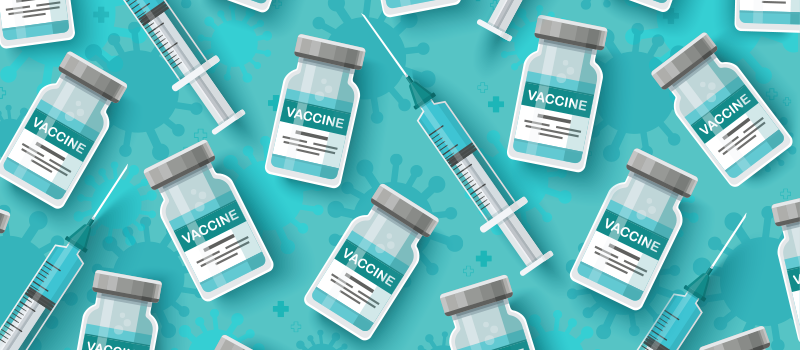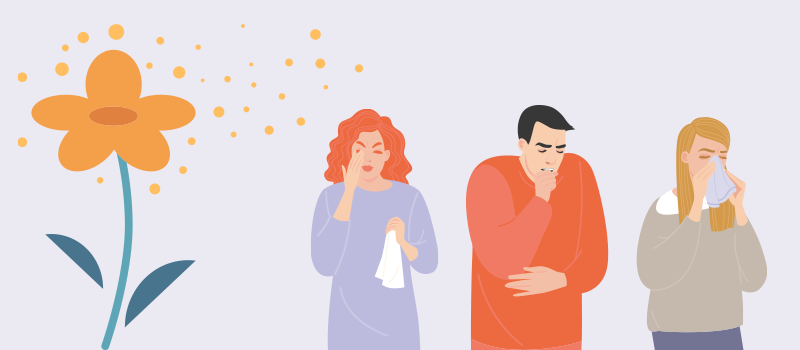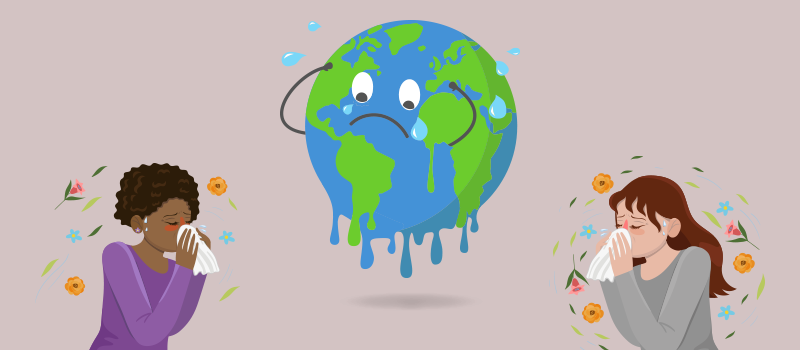What’s the Buzz
The Bee Healthy Blog
Are Seasonal Allergies Genetic?

If you and other family members suffer from seasonal allergies (hay fever), you might be wondering if there is a genetic susceptibility to this condition, i.e., whether seasonal allergic rhinitis runs in families. Please keep reading to find out some of the risk factors for seasonal allergies, including genetics and environmental factors.
What is the prevalence of allergic disease?
Approximately 8-10% of people worldwide suffer from allergic diseases, ranging from mild allergic rhinitis, food allergies, and asthma to severe anaphylaxis (throat closing).
Why do some people develop allergies?
Some people develop allergies because their immune system mistakes common environmental substances called allergens to be harmful. Common allergens include pollens, foods, and medicines.
The immune system responds by fighting off the allergens by making antibodies called immunoglobulin E (IgE) and releasing chemicals such as histamine that activates different immune cells. This response leads to allergy symptoms that can range in severity from mildly bothersome to severe and life-threatening.
For example, seasonal allergies occur when the immune system reacts to pollens and grasses, causing symptoms such as sneezing, runny nose, blocked nose, itchy nose, postnasal drip, itchy throat, and red, itchy, and watery eyes.
What are the different types of allergens?
Seasonal and perennial allergies
These are allergic reactions caused by airborne allergens such as pollen, grasses, weeds, mold, pet dander, and dust mites in carpets and mattress covers. Seasonal allergies are worse during pollen season. Perennial allergies occur year-round and are usually from allergens such as dander from domestic cats and dogs.
Food allergies
Some people develop an immune system reaction from certain foods, also known as a food allergy. It can cause gastrointestinal symptoms like upset stomach, skin rash, and swelling. Common food allergens include shellfish, peanuts, wheat, eggs, and cow’s milk.
Insect stings
Insect stings such as those from wasps, yellow jackets, honey bees, hornets, and fire ants can cause an allergic reaction. Symptoms may include pain, swelling, redness, itching, and hives at the site of the insect sting. Though rare, an insect sting can cause a life-threatening allergic reaction called anaphylaxis (throat closing).
Medicines
Certain medications can cause allergies with symptoms such as skin rash, itching, hives, and breathing difficulty. Common triggers include nonsteroidal anti-inflammatory drugs (NSAIDs) such as aspirin, penicillins, sulfa drugs, anticonvulsants, and chemotherapy drugs.
Chemicals
Pesticides, household cleaners, laundry detergents, hair dyes, and cosmetics can cause allergic reactions in some people.
Who is at risk of developing allergies?
Age, gender, race, and hereditary factors can influence a person’s risk of developing allergies. For example, eczema and asthma typically begin in childhood. Hay fever (seasonal allergies) is more common in children and young adults. Black children have an increased risk of shellfish and wheat allergies. Boys have a higher chance of developing asthma compared to girls.
Are allergies genetic or hereditary?
The tendency to develop allergies is genetic and hereditary. Children born to parents with allergies are at an increased risk of having allergies. In other words, if you have a family history of seasonal allergies, you have a higher chance of developing this condition.
It is worth noting that just because your parent has allergies does not necessarily mean you will also get them.
Another thing to note is that it’s not allergies to a specific allergen that get passed on genetically from parent to child. Instead, it is just the tendency for developing allergies that is genetic. This means kids may inherit the tendency for developing allergies from one or both parents and then develop seasonal allergies to pollens that are prevalent in their area.
In addition to genetics, other factors, such as environmental allergens like air pollution, also play a role in developing allergies. According to one theory called the hygiene hypothesis, viral and bacterial infections influence the developing immune system and may counterbalance allergen-induced allergic reactions. As a result, young children who have older siblings, attend daycare, and have regular contact with farm animals may be at a lower risk of developing allergic disease.
Are allergies inherited from your mother or father?
You can inherit allergies from your mother, father, or both parents. However, research has shown that maternal allergies create a higher risk of developing the same problems in children under 6 years of age than compared to paternal allergies. In other words, babies born to mothers with allergies are more likely to develop allergies than babies born to fathers with allergies. This may be explained by non-genetic factors such as exposure to certain substances in-utero (during the pregnancy). After age 6, allergies in both parents create the same risk in kids. If both parents have allergies, the chances of a child having allergies are 50-80%. Further studies and more research are needed to understand whether allergies are inherited from a mother’s genes or a father’s genes.
Do seasonal allergies run in families?
Allergies tend to run in families. If you have seasonal allergies, there is a high likelihood that at least one of your parents has them too.
Are you born with seasonal allergies?
You can be born with a tendency to develop seasonal allergies. Symptoms of seasonal allergies can start at any age, but they usually start after the age of 2 years. Most people with seasonal allergies develop symptoms during childhood or adolescence, typically before age 20.
What are the treatment options for seasonal allergies?
If you have had seasonal allergies diagnosed, your doctors can offer a range of treatment options, including:
- Oral antihistamines
- Oral decongestants
- Nasal sprays
- Allergy shots
References:
- https://www.ncbi.nlm.nih.gov/pmc/articles/PMC8622387/#
- https://www.ncbi.nlm.nih.gov/pmc/articles/PMC2805592/#
- https://kidshealth.org/en/parents/allergy.html
- https://acaai.org/allergies/allergic-conditions/insect-sting-allergies/
- https://acaai.org/allergies/allergic-conditions/drug-allergies/
- https://www.sciencedaily.com/releases/2020/07/200708105941.htm#
- https://acaai.org/allergies/allergies-101/who-gets-allergies/
- https://kidshealth.org/en/parents/seasonal-allergies.html#
- https://www.mayoclinic.org/diseases-conditions/hay-fever/in-depth/seasonal-allergies/art-20048343#












SOCIAL